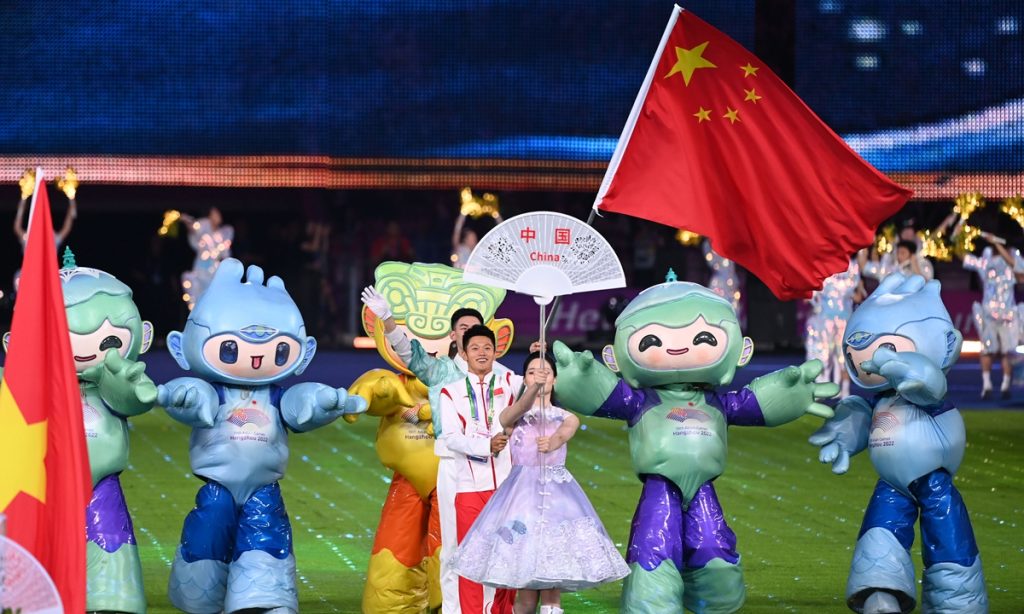Hangzhou Asian Games closes with glories, paving the way for a promising future

The 19th Asian Games, which represents brilliant Asian civilization and creates new records in Asian sports, ended successfully in Hangzhou, East China's Zhejiang Province on Sunday.
When the guests walked into the Hangzhou Olympic Sports Center Stadium, or the "Big Lotus," they were greeted by a huge lawn with the words "Enduring Memories of Hangzhou" written on it. The creative team of the closing ceremony created the most beautiful garden on a "computer numerical control (CNC) lawn" to hold a relaxing and happy party, leaving precious memories of Hangzhou Asian Games for people across Asia, and even the rest of the world.
The closing ceremony of the Hangzhou Asian Games strived for a simple and valued farewell. In about 90 minutes, four short films, two programs and one carnival were presented to express the sense of celebration and the feeling of parting, and to express China's vision of actively building an Asian community and a global community of a shared future.
The beauty of technology also continued to blossom at the closing ceremony of the Games. After the last athletics event ended on Thursday night, the "Big Lotus," quickly dismantled its competition facilities, leaving only a lawn for the closing ceremony stage. This will be the world's first "CNC lawn," pioneered by the Hangzhou Asian Games.
Sha Xiaolan, general director of the closing ceremony, told the media that the lawn hides nearly 40,000 light-emitting points. During the closing ceremony, the lawn changes to complement the performance, producing patterns such as flowers and tides.
Activating the entire performance was the "Asia" logo formed with the help of virtual AR visual effects, which fell into the stadium together with the surging tide of the Qianjiang River, covering the CNC lawn.
Every one of the more than 12,000 athletes at the Asian Games in Hangzhou is a hero. Over the past nearly 20 days, athletes have fought hard on the field. These moving moments were gathered in the closing ceremony short films.
At the same time, unlike any previous games, the athletes' entrance to the closing ceremony was integrated into the youthful and energetic song and dance performance, and the athletes changed from passive "bystanders" to active "participants," no longer only walking through the venue, but playing in their own stage.
The successful running of a large-scale event cannot be achieved without the hard work of volunteers. At the closing ceremony, the actors formed a "river of memories" to welcome the representatives of the volunteers, thanking them for their warmth and friendliness and leaving precious memories for every guests.
The closing ceremony saw Chinese culture continue to exude its charm. Sunday coincides with the day marked as "cold dew" in the Chinese lunar calendar, which is the time of the year when the lotus and laurel alternately open in Hangzhou. As guests bid farewell to Hangzhou, the carnival conveys the timeless friendship of "Flowers for parting friends" and the aspiration of "The lotus and the osmanthus in harmony," leaving a wonderful memory of Hangzhou Asian Games.
Before the closing ceremony at the stadium, Yasodara Dunuwille Koralege, a reporter from Sri Lanka, carefully flipped through the closing ceremony program.
With cherished memories, Yasodara expressed that when she returns to Sri Lanka, she will share her experience of an unparalleled sporting event in China. She said, "It has been a wonderful experience, and Hangzhou welcomes everyone to visit."
The "digital torchbearer" bearing the enthusiasm of over 100 millions of people across Asia at the opening ceremony made a comeback at the closing ceremony. In his "hand heart" gesture, the fireworks of the main torch tower slowly extinguished. The digital man reluctantly looked back, and finally left the main stadium, stepped on the Qiantang River, and ran into the distance.
It is like this, with the "digital torchbearer" carrying tens of thousands of athletes' memories and stories in Hangzhou, the Asian Games are being led toward a broader and brighter future. As Raja Randhir Singh, the acting president of the Olympic Committee of Asia (OCA), stated to the Global Times, "the legacy left by the Hangzhou Asian Games has set a great example for all future major sporting events."